Recently, I heard a publishing “guru” talk about his approach to writing and marketing books. He publishes dozens of books each year with nothing more than quick proofread, which he does himself. He then promotes them using various Amazon hacks.
This guy was breaking most of the book marketing commandments!
While cranking out lots of poor quality titles may bring in money in the short term, it won’t get you on the New York Times bestseller list and it won’t build an enduring author brand. I tend to work with bestselling authors or authors who want to be bestselling authors.
What does it take to become a bestselling author?
After working with New York Times bestselling authors for nearly a decade, I have learned what works and what doesn’t. For the first time, I have gathered my approach together into Ten Book Marketing Commandments.
This is my manifesto on publishing and book marketing.
Commandment #1 Love thy reader as you love thy book.
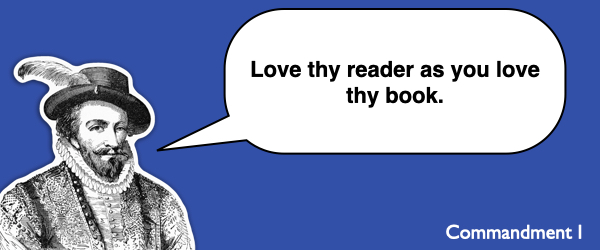
This is the greatest commandment and it is the first button on the shirt. If this lines up, all the other buttons line up. If this is wrong, you can’t fix it with the other commandments.
Books only matter when the words exist in a reader’s mind. If readers won’t crack open your book, it’s nothing more than dead trees and ink. Those trees gave their lives so your ideas could have a place on the page. You owe it to the trees to create a book that readers will want to read.
If you want readers to care about your book, you need to care about readers. Click to Tweet.
If you want to write a book readers want to read, you need to write the kind of book readers already want to read. Click to Tweet.
This means you must know what your readers are looking for.
Know Thy Reader
Pick at least one human and write for that human. If you can write for the one, you can write for the many. Choose a representative human who likes to read the kind of book you write. If you write for young adults, your representative reader should be a young adult.
Many authors call this representative human a “beta reader.”
Creating an imaginary reader persona or avatar is not enough. Imaginary friends always like what we write. When you ask them for feedback, you are only talking to yourself.
But when you ask a real beta reader for feedback, you are accessing another human brain.
Humans matter.
Listen to Thy Reader
Now that you have at least one target reader identified, you want to ask that reader questions.
- Why do you read books?
- What do you like about the books you read?
- Who writes the books you like to read?
- Where do you hang out online?
- What are your pain points that my story or nonfiction book could help alleviate?
Learning to reach, serve, and thrill your representative reader is the key to learning how to thrill and serve millions of readers.
Serve thy Reader
With the above answers in hand, you should be able to figure out what kind of book your reader wants to read. Now, write that book.
A lot of new authors fall in love with their books. The book is their baby. They write the whole book, and only after they finish do they start to think about how to market their book to readers. Then, they spend a fortune trying to find readers for that book.
This is backward!
These authors learn the hard way that readers don’t want a book that wasn’t written for them. Readers can tell when authors don’t care about them. Caring about your reader isn’t something you tack on at the end as a promotional tactic. It is where you must start.
Get Help With Commandment #1
Novel Marketing has some more episodes to help you get to know your readers:
- How to Get to Know Your Readers
- Marketing 101: How Readers Make Buying Decisions at Physical Bookstores
- How to Get 10,000 Readers and then Keep Them Happy
- How to Find and Work with Beta Readers
Commandment #2 Thou shalt write for thy reader, not for thyself.
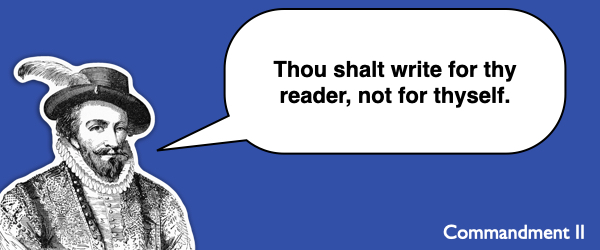
The second commandment is like unto the first.
The difference between a book and a journal is the audience. You write a journal for yourself. You write a book to thrill your reader.
Experienced authors understand this commandment. They call it “killing your darlings.” To kill your darlings you cut parts from your book you personally love. These are your darling sentences, paragraphs, characters, and plotlines. You don’t kill them to make yourself sad. You kill your darlings because your reader wouldn’t enjoy them. This is the sacrifice required to prove you are worthy of success.
“Are you willing to put your readers’ enjoyment of reading your book over your enjoyment in writing your book? If not, you are not ready for publishing success.” Click to Tweet
Only a few authors are genuinely willing to write for their readers and murder the fluff. You’ll find these writers on the bestseller list. They tend to work with multiple editors to make sure every paragraph has a purpose.
Write the Back Cover Copy First
One exercise to help you obey this commandment is to write an initial version of your back cover copy before writing your book. Describe why the book is worth reading before you write the book.
Imagine your human from the first commandment asking, “Why would I enjoy reading this book?” Answer that question first.
If you want to have followers, you must first be a servant. This is not a new commandment!
Screenwriters call this “writing the poster first.” International Bestselling author Steven Covey calls this “Begin with the end in mind.” New York Times Bestselling author Simon Sinek calls this “Start With Why.”
I call it serving your reader.
Get Help With Commandment #2
Novel Marketing has several episodes to help you write for your reader:
- Writing for Your Website – How To Craft Pages That Readers Actually Want to Read
- How to Write Bestselling Back Cover Copy
- How to Craft a Compelling Elevator Pitch for Your Book
Commandment #3 Thou shalt persist in thy craft.
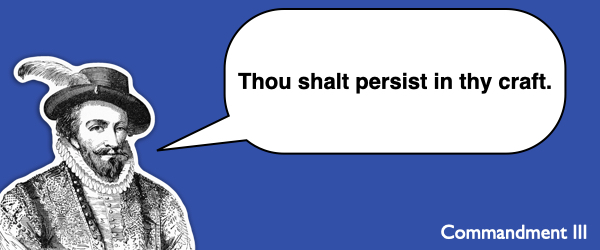
Improving your writing is harder than you think. While everyone can write, few can write well. It’s the difference between running to catch the bus and running in the Olympics. Most people can run to catch a bus, but only a few are willing to put in the time and effort to train for Olympic level running.
In 2016, 46 Americans won Olympic Gold Medals. That same year only 29 novelists were #1 New York Times Bestsellers. More Americans won Olympic gold medals than hit number-one on the New York Times Bestseller list in 2016.
Training in the craft of writing is not easier than training for the Olympics. While learning to write well involves less sweat, it may require more tears, as any successful author will tell you.
So what should you do to train for Olympic-level writing?
Read Books on Craft
This is one of the few industries where the masters share their secrets. Start with the memoirs of successful authors. On Writing by Stephen King (Affiliate Link) and Bird by Bird by Anne Lamott (Affiliate Link) are great places to start.
I also recommend reading Chris Fox, Randy Ingermanson, Joanna Penn, and James Scott Bell (Affiliate Links). Not only have they been guests on this podcast, but they each have excellent books on craft.
Submit Your Writing to Expert Feedback
Every Olympic athlete has a coach. You need a coach as well. Many people in this industry can help you become a better writer, but none of them will help you if you’re unwilling to share your work.
I recommend that novelists write short stories so that it’s easier to get feedback. While it is hard to get feedback on a 100,000-word novel, it is easy to get feedback on a 5,000-word short story. Feedback from experts will make you a better writer.
Read Good Books
As New York Times Bestseller Stephen King says, “If you want to be a writer, you must do two things above all others: read a lot and write a lot. There’s no way around these two things that I’m aware of, no shortcut.”
Keep writing!
Olympic athletes wake up early in the morning to train, even when they don’t feel like it. Bestselling authors sit down and write even when they don’t feel like it. They don’t whine about writer’s block. They write!
You may be wondering why the first three commandments were about readers and craft rather than marketing. But each commandment is part of marketing. Good marketing can’t fix a bad book. What’s worse, good marketing for a bad book ruins the author’s reputation.
Marketing is critical, though. A good book with bad marketing gets lost in the noise and slowly dies unread in obscurity.
Get Help With Commandment #3
My course, The Five Year Plan, is devoted to helping you develop Olympic levels of writing and marketing. While it takes most novelists ten years to get good, this plan enables you to do it in half the time.
We also have over a hundred articles, episodes, and blog posts about writing.
Commandment #4 Thou shalt measure thy marketing.
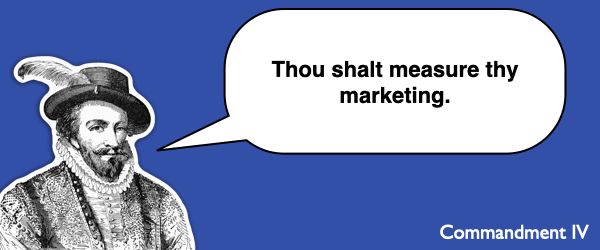
The publishing world is polluted with book marketing superstitions. Compounding the problem is a fog of variation. Every book, author, and audience is different. That hot new marketing tactic someone shared in a Facebook group may be a superstition. It may be a valid tactic that won’t work for you, or it could be just what you need to take your platform to the next level. How do you know?
How do you find your way through the marketing advice smog?
Data. Data is the light that shines through the mist to reveal the nonsense from the knowledge. Next time someone shares a hot new tactic in a Facebook group, ask for their numbers. If they don’t have numbers, suspect nonsense.
How do you get marketing data? You experiment and measure your marketing. So what should you track?
- Track thy time.
- Track thy money.
- Track thine efforts.
Once you know what works and what doesn’t, you can cut what doesn’t work and redirect your time, money, and energy toward what works. The more you track, the more effective your marketing becomes. Measuring helps guide your efforts whether your offline giving speeches, online recording a podcast, or writing lots of books.
Get Help With Commandment #4
Novel Marketing has three episodes to help you learn more:
- How to Spend LESS Time Marketing Your Book
- How to Track Your Book Promotion
- How to Use Marketing Data To Sell More Books
We also have almost a dozen articles and episodes on Author Media on measuring your marketing.
Commandment #5 Thou shalt not dig thy well whilst thou art thirsty.
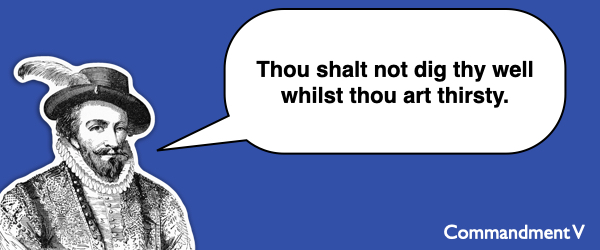
The publishing world is full of wolves who know how to separate new authors from their money. They prey on authors who are desperate to make money quickly. Remember, the wee-little-pig who quickly built a straw house got eaten by the Big Bad Wolf. Building with bricks is more expensive and time-consuming, but it’s much sturdier in the end.
I feel bad for authors who are so cash-poor they are stuck using MailChimp. If something doesn’t change, they may never escape their obscurity. If your worldview says you must always choose the cheapest option, you won’t make it in publishing.
Pace Yourself
It takes time and money to develop your craft and build your platform. Most authors give up before they get good enough to see success. So pick a pace you can afford to maintain for ten years. Publishing is not a way to get rich quickly. Only the Big Bad Wolf says otherwise.
Create a Budget
The best way to set a sustainable pace is to create a budget for your time and money, and then stick to your budget. Each month, set aside only the time and money that you can afford to set aside. If nothing comes from your writing for years, you still need to eat and feed your family.
As my dad says, “Make enough to live on, and then live on what you make.”
Get a Job
It takes money to make money in publishing. But don’t go into debt to publish your book. If you can’t afford the bricks, get a job working for another author.
“And if you are not faithful with other people’s things, why should you be trusted with things of your own?”
Jesus
Jesus
Many jobs can make you money and help you improve your writing, publishing, and marketing skills.
These include:
- Editor
- Blogger
- Virtual Assistant (VA)
- Marketer
- Webmaster
Every successful author needs a VA (virtual assistant). Being a VA gives you a chance to learn from top authors while simultaneously making money. You can work from home helping an author with research, marketing, social media, websites, or booking guest interviews.
The best editors are some of the best-fed people in this industry. As they say, “Publish or perish, the editor always gets paid.”
Get Help With Commandment #5
I have a free course on How to Build Amazing Author Websites. Authors have taken the course, and within weeks they are earning money building websites for other authors who are too busy to take the course themselves.
Commandment #6 Thou shalt own thine own platform.
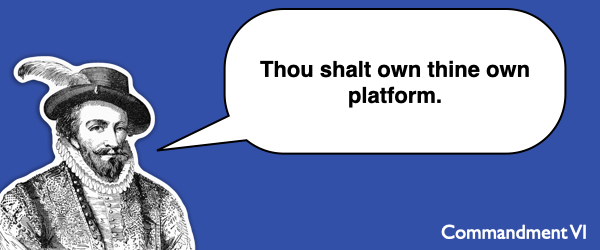
Free platforms, such as social media or free website hosts, tend to work only for a short time. After their short-lived usefulness, several things may occur.
- They go out of business.
- They start charging you to talk with your readers.
- They get flooded with spam.
Moving from free platform to free platform is exhausting. Each time you are forced to move, you lose followers.
When I first started in this business, Blogger and Myspace were the hot free platforms for “building your platform.” Those got flooded with spam and stopped working.
Then it was Twitter and Facebook. Twitter got flooded with snarky trolls, and now it’s impossible to be heard over the din unless thousands of people retweet you.
Facebook fought the noise problem by making authors pay to talk to their readers on Facebook. Noise problem “solved.” But now, Facebook is no longer a free platform. You can spend years building a following on Facebook only to find out Facebook hid your Amazon link to your book, hoping you’ll pay to boost your post.
Now authors are moving to platforms like Instagram. But Instagram doesn’t allow you to link to your book on Amazon unless you have at least 10,000 followers. It’s nearly impossible to get 10,000 subscribers on Instagram without getting a head start, being famous already, spending a lot of money, or demeaning yourself.
Social Media is a bad place for authors to get famous. Social Media is for famous authors to interact with the readers they already have. Click to Tweet
Social media sites are great places to visit but terrible places to live. Not only is it bad for your mental health, but it is also bad for your marketing. If anyone tells you differently, go back to Commandment #4 and ask to see their numbers.
What should you do?
Build your platform on land you own. You you own your digital land when you can move without consequences.
Don’t like MailChimp? You can move to ConvertKit (Affiliate Link) in about 15 minutes, and your subscribers will move with you and won’t even notice.
Don’t like Bluehost (Affiliate Link)? You can move your website to WP Engine (Affiliate Link). It takes about an hour, but your website visitors won’t even know there was a change.
If you want to move away from Facebook, on the other hand, you lose everything and you’ll have to start from scratch. If you post on Facebook asking people to follow you on Twitter, Facebook will hide that post because they want you to stay on Facebook.
Building your platform on a free social network is like building a house on land that someone else owns. At any time, they can kick you off and keep your hard work for themselves. Don’t believe me? Read their Terms of Service.
The two most important things to own are your website and email list.
Own Your Website
I recommend WordPress.org hosted on a reputable website host like Bluehost (Affiliate Link) or WP Engine (Affiliate Link) for author websites. Your website is your home base. It is the hub of the wheel. Everything else you do online should bring readers back to your website to buy your book or join your email list.
If you decide to start blogging or podcasting, your blog and podcast content can live on your website. Your website is also the home of your press kit, your book pages, your speaking page, and more. It’s often the first place readers go to find out how to connect with you.
Own Your Email List
Once they visit your website you want them to join your email list. For author email, I recommend using a reputable email service provider (ESP) like ConvertKit (Affiliate Link) or MailerLite (Affiliate Link). To find out how these two services compare, and to learn why I no longer recommend MailChimp, listen to Episode 251 – How to Pick the Right Email Platform.
Get Help With Commandment #6
I talk more about how to own your platform in these episodes:
- How to Survive Cancel Culture as a Writer
- How to Build an Author Website in a Day
- How to Start an Author Podcast
Novel Marketing also has over 200 episodes and articles on platform-building.
Commandment #7 Thou shalt weigh thine options before investing in marketing.
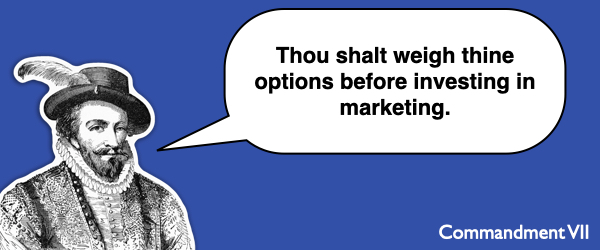
Every successful author spends money on marketing. Even traditionally published authors spend money on websites, travel, conferences, and email.
But money isn’t your most valuable investment. You must also invest your time. You can always make more money, but you can never make more time. The grim reaper comes for all of us eventually.
Don’t ask yourself if buying a billboard will help you sell more books. The answer is almost always “yes.” Any marketing activity will help you sell at least one book. But just because something helps you sell books doesn’t mean it is a wise investment for you.
It’s better to ask, “Will this help me sell more books than the next best alternative?”
Determine Your Options
To weigh your options, you need to know what your options are. This is why Commandment #3 is important. You want to persist in the craft of writing and marketing so you will better understand your options. That is why it is so helpful to subscribe to podcasts like Novel Marketing.
Comparing options is nothing new. My business professors called this “opportunity cost.” When you choose to spend four hours at a book signing, you are choosing not to spend those four hours writing your next book (or whatever else your next best alternative is).
You can’t weigh your options if you do not measure your actions. This is why Commandment #4 is so important. But measuring your options won’t help unless you use the data you gather to make better decisions.
Count the Cost
You must determine how much time and money you can invest (Commandment #5).
Some authors are time-poor and cash-rich. A time-poor author will choose a different option than an author who is cash-poor and time-rich. A cash-rich author may hire someone to build a website while a time-rich author will learn how to do it herself.
If you are cash-poor and time-poor, you are not ready to become a bestselling author.
To succeed in publishing, you must make writing a priority, and that means investing time and money. How can you reap book sales if you are unwilling to sow effort and investment?
Get Help With Commandment #7
Novel Marketing has a couple dozen episodes and articles with business advice.
Commandment #8 Thou shalt surround thyself with savvy authors.
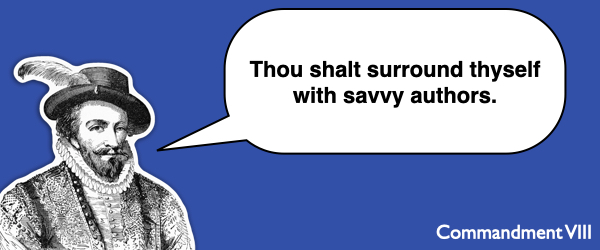
There are some things you can only learn from other authors. The savvier your friends are, the more you will learn. This is obvious, of course, we all know the famous authors of the past were close friends.
So, why is it so hard to make author friends?
Reason #1 Artifice
Many authors only interact with other authors in Facebook groups or other online forums. While Facebook groups are better than nothing, there is a difference between a Facebook friend and a real friend.
It is hard to make real friends on Facebook because people only see what you want them to see. This leads to a false projection of your true self. Your Facebook profile becomes a mask, and when everyone is wearing masks, it is hard to form a true community.
Facebook groups can be a great place to get started. You don’t need to know anyone to join the Novel Marketing Facebook Group for instance. You just need to listen to the podcast or read the blog. But Facebook groups are no substitute for actual friendships with fellow authors.
Typing is not enough. Authors need a place where they can talk. It doesn’t need to be in the same room, but it does need to be face-to-face. A community that meets regularly on Zoom is immeasurably better than a Facebook group where people are typing at each other and clicking like a lot.
When people see a face and hear a voice, a much more meaningful bond is formed. You’ll need this bond to get through the tough times of writing.
But even if meet in person or over video calls, you must overcome a second challenge.
Reason #2 Pride
Pride makes it hard to make author friends.
Pride keeps authors from sharing their failures and asking questions. There is pressure to look like you have it all together, especially if you are trying to attract a publisher. When everyone hides their mistakes, authors can only learn from their own mistakes. And let me tell you, learning from your own mistakes is the worst.
When we share our mistakes, other authors share their mistakes and we all learn from each other’s failures. Authors who embrace humility find there is no limit to what they can learn the easy way.
Reason #3 Envy
While pride keeps us from learning from each other’s failures, envy keeps us from learning from each other’s successes. Authors are often afraid to share their successes lest other authors secretly hate them.
Envy is toxic in any community, but it is especially toxic among authors where success is not evenly distributed. Can you be friends with an author who is selling 100 times more copies than you are?
Envy can become a barrier between you and the authors who can teach you. Once envy takes root, you stop developing as an author and start hating those around you. At the very least, you’ll stop learning from the authors who are further along in their journeys. Guard against envy.
If you want to be friends with savvy authors, you must reject your tendency to envy.
Get Help With Commandment #8
I host a handful of mastermind groups. Each group is limited to 10 authors, and we meet monthly over Zoom. We also share a Slack Workspace where we answer each other’s questions throughout the month, cheer progress, and keep up. If you are looking for a place to connect with savvy authors and me, these groups are for you. You can learn more about our mastermind groups here.
We also have a course called How to Start a Writers Group.
Novel Marketing has episodes on How to Start a Mastermind Group.
- 029 – How to Start a Mastermind Group
- 135 – How to Start a Local Writers Group
- 101 – Why Mastermind Groups Give Bestselling Authors an Edge and How to Start One
Commandment #9 Thou shalt not publish thy first book first.
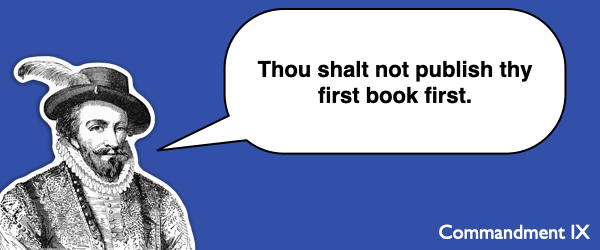
This is the most controversial commandment. Few would disagree with Commandment #3 Persisit in Thy Craft, but many authors feel the first book they have ever written in their life is a masterpiece. As James L. Rubart says, “The way to learn how to write a book is to write a book.”
An athlete’s first race is not for a Gold Medal, and your first book is not a masterpiece. At least, it’s not a masterpiece yet.
When you finish your first book, you are too close to it. You are standing inside the jar, trying to read the label. It often takes years of craft development to gain the perspective to see the flaws in your freshman effort.
Many authors try too hard for too long to get that first book published, and it leads to author burnout. These authors often end up with dozens of rejection letters, or they go indie and get dozens of sales which is worse! They give up on writing because they think something is wrong with them.
If only someone had the heart to tell the author she needed more practice, the burnout and discouragement could have been avoided.
For some authors, like Stephen King, that first book never does get published. Other authors can return to their first book years later with new skills and abilities and transform it into a masterpiece.
After a few years of writing, returning to your first book is like the Hobbits returning to the Shire after saving Middle Earth. You had no idea how bad things were in your first manuscript, but now that you know, you realize you’ve gained the skills to do something about it.
Do yourself a favor, and don’t publish your first book first. Let that first book be the learning experience it was meant to be, and then write the next book. You are a writer! Writing is what you do. So write the next book.
Nothing helps your career like having your first published book be a massive hit. Success leads to success as you have more credibility and marketing money with each triumph. The successful authors who appear to have written runaway hits right out of the gate were often have multiple books sitting on thier hard drives. Their “first” book published is actually the third or fourth book they have written.
If your first book is a dud, often the traditional publishing doors close to you. Authors with a bad sales history have a bad-sales odor, and no publisher wants to get near.
If you are indie published, poor sales numbers on your initial book will cost you money. The money you spent on that first book is unavailable when it comes time to market the next book, and it creates a vicious cycle. The more money you lose the less money you have to invest in subsequent books. This vicious cycle could have been avoided with practice and patience.
What About To Kill a Mockingbird?
Writers often balk and ask, “What about the book To Kill a Mockingbird? It was her first book and a masterpiece.”
But that is not what happened. Harper Lee started by writing short stories for her campus magazines. Then she wrote a book titled Go Set a Watchman, which was “unfit for publication,” according to her publisher.
Harper Lee then kept writing until To Kill a Mockingbird emerged from the ashes of Go Set a Watchman. Half a century later, an edited version of Go Set a Watchman was published, and readers hated it. It has one of the lowest Amazon star ratings I have ever seen on a New York Times bestselling book.
If Harper Lee had published Go Set a Watchman first, she would have had a bad sales odor, and she may never had written To Kill a Mockingbird. The world would be worse off as a result. Thank God she kept writing and didn’t publish her first book first!
Commandment #10 Thou shalt not be false to thine own brand.
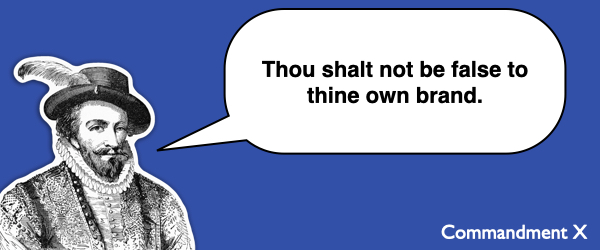
While the first commandment “Love thy reader as you love thy book,” is the most important, commandment ten is the culmination of all the other commandments. If you want to have a good brand, follow the first nine commandments.
“Brand” is a trendy word for an old concept. Our ancestors used the word “reputation.” The ancients used the word “name.” As King Solomon once said, “A good name is more desirable than great riches; to be esteemed is better than silver or gold.”
While you may write many books in your career, you only get one reputation. Be true to who you are as an author.
Your brand is not a photo, logo, genre, or collection of fonts. It is the story you tell about yourself. More importantly, it is the story others tell about you.
It takes a lifetime to build a reputation. It takes only one stupid mistake to destroy one. As you make promises to your reader, remember that your reader expects you to keep those promises.
Authors make promises to readers by writing books. Readers assume your next book will be like your last book. People expect Stephen King’s books to be dark and James Patterson’s books to be thrilling.
You can grow your brand, but it grows where it is planted. Plant your brand in a place you are willing to live for the rest of your career. The more successful a brand becomes, the harder it is to write anything other than what readers expect.
Some authors don’t realize their first book set the course for the rest of their careers until it is too late. So don’t be too quick to publish your first book. It is fine to write a book and hold onto it for a while to see if it’s worth publishing.
Get Help With Commandment #10
Novel Marketing has a four-part series on branding:
- Step 1 – Look in the Mirror
- Step 2 – Look at Your Readers
- Step 3 – Look Through Your Readers
- Step 4 – Look in Your Reader’s Mirror
We also have a couple dozen episodes and articles on branding.
The Ten Commandments of Book Publishing aren’t a step-by-step plan. They are a set of guidelines. If you follow them, you will have the freedom to try a lot of things. These are the commandments that bestselling authors follow. Sometimes they discover the commandments by breaking one and learning from the painful experience.
You can learn from the mistakes of other authors and follow these commandments to become a bestselling author.
Announcement
As you know, I currently have two signature courses.
The Five Year Plan is about developing your craft. Most authors fail to become bestsellers because they publish before they are ready. The Five Year Plan helps you work on the right things at the right time in the right order to become a bestselling author.
The Book Launch Blueprint prepares authors for the months leading up to the book’s launch. We had an incredible response to the Book Launch Blueprint this year. Many of our students have already launched their book, and quite a few were the #1 New Releases or Category Bestseller.
As we worked through the Book Launch Blueprint this year, I noticed some authors came to the course with little or no platform. With only a few hundred email subscribers, they were hoping to launch bestselling books.
They were frantically trying to build platforms overnight and became exhausted and overwhelmed. Rome wasn’t built in a day, and you don’t want to get famous overnight. It takes years to build a solid platform.
I realized they needed a course to bridge the gap between the Five Year Plan and the Book Launch Blueprint. They needed a course on How to Build a Platform.
I haven’t settled on a name yet, but I am thinking about Obscure No More: How to Build a Platform Publishers Can’t Say No To. I like that title, but indie authors also benefit from having a large platform. If you have a better title idea, will you let me know?
The course will officially launch in the fall of 2021, but I will soon be looking for some beta students to go through the course as I make it. These beta students will not be the first to access the course, but they will get special Q&A calls with me where I will answer platform questions and get their feedback on how to make the course better.
Beta students will have lifetime access to the course. They’ll get the first versions of the sessions as well as the polished versions for the next year’s students. Beta students will also receive a massive discount on the price of the course.
Registration for the beta program will be limited. I will open up registration to the authors in the mastermind groups first, then patrons, then email subscribers. If there are any spots left, I will announce it on the podcast and in the blog.
If you are interested in being part of the Obscure No More beta program, register for our email newsletter at AuthorMedia.com or, better yet, become a patron of the podcast.
The post The 10 Commandments of Book Marketing appeared first on Christian Publishing Show.




Thomas,
Wow! A lot of great info to unpack! As a regular reader here, I also liked the expansive show notes. While I can’t always listen, I can usually read, so the “pseudo-transcript” was a welcomed feature.
Wishing you the best on launching the new course.
I am happy to kill the fluff to meet the commandment – ‘Serve thy reader’.
Thanks so much for this Mr Laube. It is like a crash course and I am going to print it out and take my time to study it all through. God bless you, Sir.
Hi Thomas,
Just a quick question. In the article you said you didn’t recommend using mail chimp, but I noticed the service that delivered the blog from the agency was mail chimp, any reason why?
Book Title: To launch out into the deep. A platform line with bait.
Thank you for this great article, Thomas. It is packed with information and opportunities that I need RIGHT NOW. For your course, how about this:
Bridging the Obscurity Gap: How to Build an Irresistible Platform. Whatever you name it, it sounds like I need to take it. I don’t have a website, I haven’t started writing my first book. I’ve written for corporate marketing and email newsletters. Writing fiction (or nonfiction for that matter) under a Christian umbrella will be a whole new world. I’m going to need every tool and tip I can find.